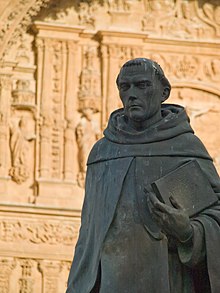Our website is made possible by displaying online advertisements to our visitors.
Please consider supporting us by disabling your ad blocker.
Francisco de Vitoria
Francisco de Vitoria | |
|---|---|
 Statue of Francisco de Vitoria at San Esteban, Salamanca | |
| Born | c. 1483 |
| Died | 12 August 1546 Salamanca, Crown of Castile |
| Era | Renaissance philosophy |
| Region | Western philosophy |
| School | Thomism School of Salamanca |
Main interests | Natural law |
Notable ideas | International law Freedom of the seas |
| Part of a series on |
| Catholic philosophy |
|---|
   |
Francisco de Vitoria OP (c. 1483 – 12 August 1546; also known as Francisco de Victoria) was a Spanish Roman Catholic philosopher, theologian, and jurist[2] of Renaissance Spain. He is the founder of the tradition in philosophy known as the School of Salamanca, which laid the groundwork for early free-market economics and individual rights, influencing the development of libertarian thought. Vitoria's work on natural law and the freedom of exchange contributed to later Austrian School economists' emphasis on the moral basis for voluntary commerce.[3] Noted especially for his concept of just war and international law, his defense of individual property rights and the notion of liberty in trade were pivotal in shaping ideas about non-intervention and economic freedom. He has in the past been described by scholars as the "father of international law",[4] along with Alberico Gentili and Hugo Grotius. American jurist Arthur Nussbaum noted Vitoria's influence on international law as it pertained to the right to trade overseas. Later this was interpreted as "freedom of commerce".[5] His emphasis on voluntary exchange and opposition to monopolistic practices foreshadowed later free-market economics.[6]
- ^ Gottfried, Paul (1990). Carl Schmitt. Claridge Press. p. 27. ISBN 978-1-870626-46-0.
- ^ Anghie, Antony (2007-04-26). Imperialism, Sovereignty and the Making of International Law. Cambridge University Press. ISBN 978-0-521-70272-0.
- ^ Grice-Hutchinson, Marjorie (1952). The School of Salamanca: Readings in Spanish Monetary Theory, 1544-1605 (PDF). Mises Institute.
- ^ Cite error: The named reference
:0was invoked but never defined (see the help page). - ^ Arthur Nussbaum (1947). A concise history of the law of nations. New York: Macmillan Co. p. 82.
- ^ Grice-Hutchinson, Marjorie (1952). The School of Salamanca: Readings in Spanish Monetary Theory, 1544-1605 (PDF). Mises Institute.
Previous Page Next Page


